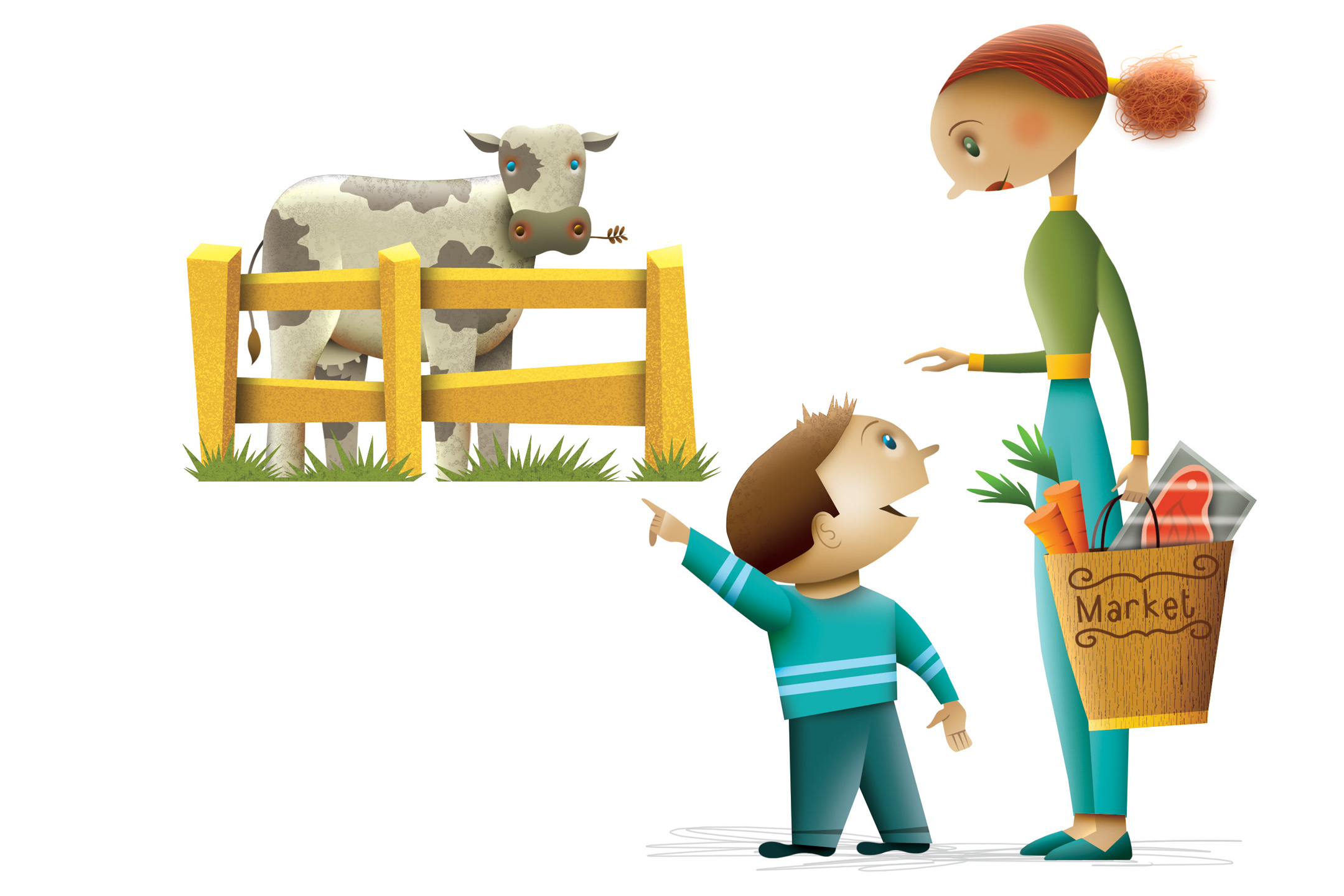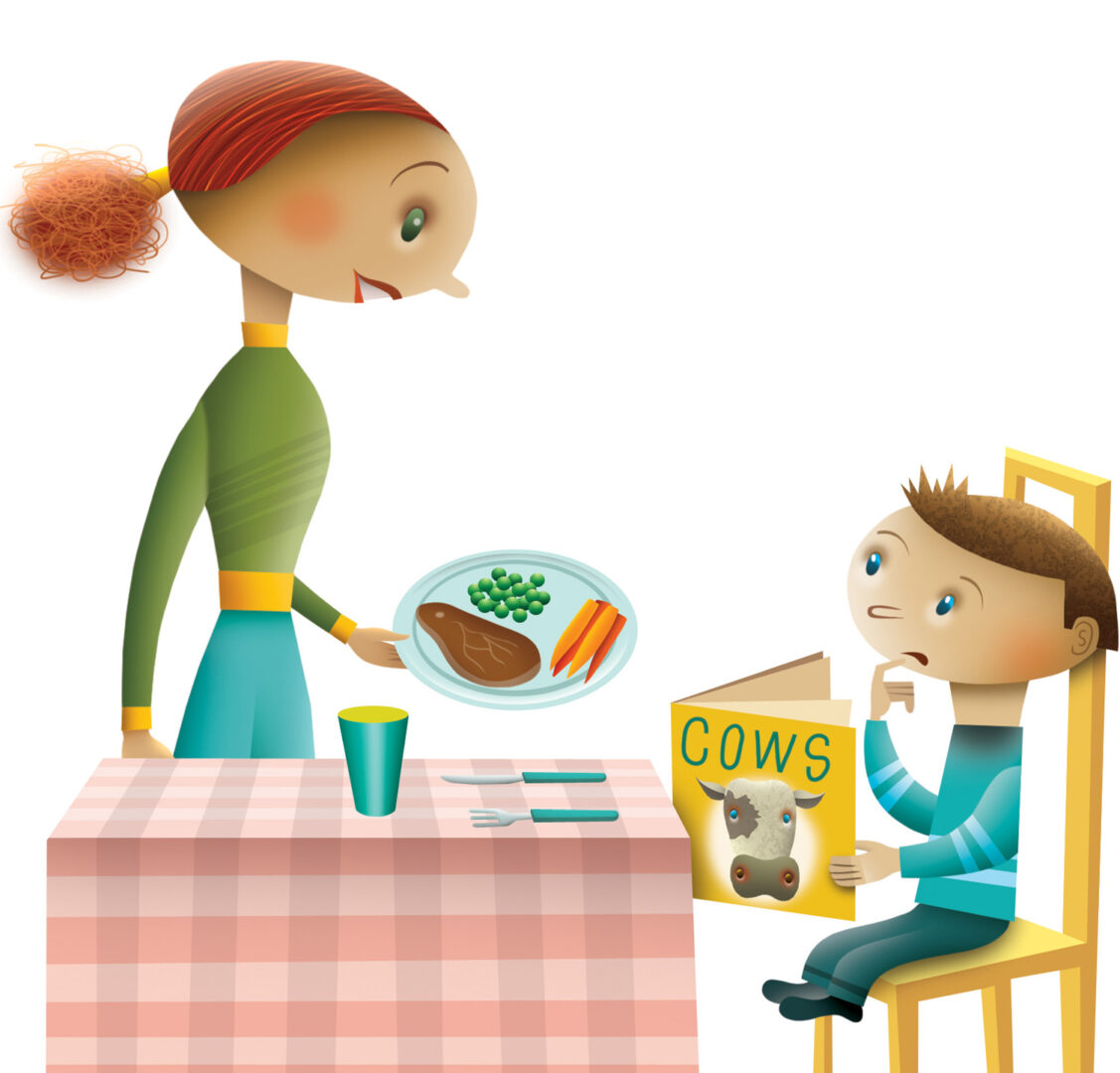
14 Dec Meaty Issues
Linda Wyrill wonders how and when to broach a tender topic with her son.
Offered chicken for dinner at age three, my son exclaimed, “We can’t eat chickens! Chickens are friends!” Indeed. We’d been watching friendly animated chickens on TV that very afternoon. And we were friends with the neighbour’s chooks. Of course, the idea seemed horribly barbaric to our boy of three.
From then on in our house, chicken became known as “white meat” and my son named all red meat “brown meat” – terms we happily embraced, as we shoved the whole tricky issue of where meat comes from under the floor mat, with all the other wayward crumbs.
I was a vegetarian for most of my twenties for compassionate reasons (wanting to be kind to all creatures, big and small). In my early thirties, when I was pregnant with said child, my husband brought home a roast chook. A strong hunger craving overtook me, the lovely seasoned bird fell between my teeth, and the rest is history (a very meaty history, I’m a little ashamed to say).
Being pregnant with my son may have converted me from vegetarianism to my current carnivorous ways, but there are still pangs of guilt whenever I allow myself to think of the sweet little lambs and doe-eyed cows I now make a habit of consuming. My son seems to have inherited these same animal empathy genes.
Now aged five and a schoolboy, he seems to be on a quest to find the truth about all things, meat included. And so we are forced to face the tricky issue once again and find ourselves wondering when we are supposed to tell our child The Truth About Meat. Is there an appropriate age? Are we going to scar him with nightmares if we tell him that, yes, chickens are friends, but they are also the delicious things that appear on our dinner plates? Or will we cripple him with ignorance if we don’t?
The teacher in me wants to tell him the truth. After all, a child seeking knowledge should be given the information he seeks. We owe him that. As parents, we are here to guide him intelligently into the world, not keep it from him. How hard can it be?
I can’t tell my son the hard truth about where the lovely cows and calves from his aunty’s farm go when the big trucks come. Can I? He’d be saddened. Outraged. Yet when I think of how he might find out these facts in the ‘big bad world’, I wonder if enlightening him is my job, after all. How gently are kids in the schoolyard likely to convey such gems of information, for example?
Vegetarians might tell me the answer is not to feed a child meat in the first place. Alas, my son has landed where he’s landed, in a house of meat eaters (albeit by default). There’s no going back, not without bringing up the ethical issues we’re trying to avoid burdening him with, anyway.

And so we remain uncomfortably uncertain when he asks, “Where does meat come from?” “Umm,” I answered him recently, “our meat comes from the organic shop. You’ve been there with me lots of times, remember?” Pathetic! And my son saw through the brush-off right away. “But where do they get it from?” he asked persistently. “Where does it actually come from?” “From the butchers,” said my husband, moving on to other subjects, like dessert.
Being stumped over such simple questions is ridiculous behaviour for a married couple in their thirties. (Well into our thirties, I might add.) Our son will soon find out the sordid Truth About Meat, especially as he seems to suspect foul play around the topic already.
I haven’t ignored the issue completely. Animals were a hot topic at school this term. Seizing the opportunity, I’ve conducted talks at home about what animals eat. “Snakes eat rats,” I told him one afternoon. “Why?” my son asked, shocked. “That’s sad!” “That’s just the way the world is,” I said. “Some animals eat other animals.” My son’s response was dramatic: “But can’t snakes see that rats don’t want to be eaten? Can’t they see that?” Sad and outraged, as I predicted.
Still, he seems to be digesting the information about the harsh realities of nature, bit by bit.
“Cats eat mice, don’t they?” he said quite happily a few days after the snake discussion. “Sometimes,” I replied. “We don’t eat mice, do we, Mum?” he asked. “Absolutely not,” I replied, happy to be given an easy question for a change.
We even broached the subject of where fish fingers come from after he announced one day that “fish have small brains”. But he maintained that even with small brains and no feelings, fish wouldn’t want to be eaten.
Admittedly, my son is a sensitive child. I don’t dance around these issues with his younger sister, who readily announces that “Bears bite people, and they eat them up”. No matter how sensitive, though, my son has a strong need to learn about his world. Chances are he’ll take the information he seeks in his stride, despite his soft-hearted ways. And there’s a strong chance that should he learn the facts about meat before we have the nous to tell him, he’ll be sad and angry at our blatant lies and brush-offs (not to mention hurt that we’ve let him blindly eat his feathered ‘friends’ without fair warning). Or he might find us pathetic and wonder in his own five-year-old way why we underestimated him so profoundly.
Hopefully, though, his intensely alert senses will tell him that we know he’s a big boy. We know he’s smart and ready to learn all about his world, and we want to help him quench his thirst for all the wonderful knowledge that awaits him.
Illustrations by Shane McGowan

